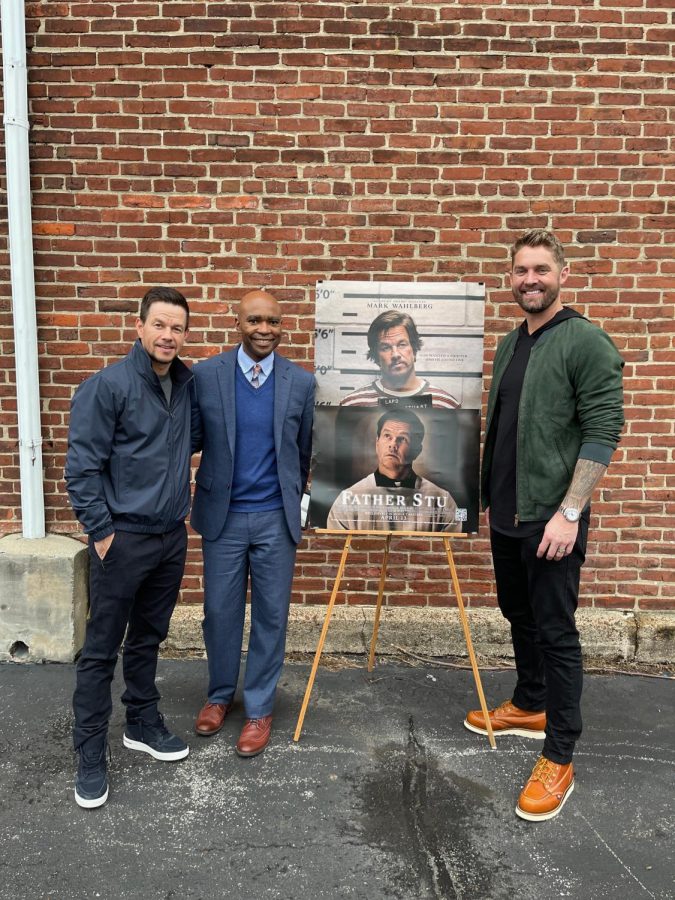Unconventional Priest Inspires Mark Wahlberg: The Villanovan Interview
Courtesy of Dean Emory Woodward
Wahlberg with Dean Woodward and country music star Brett Young for the Villanova screening of the film.
April 13, 2022
An actor. A boxer. A Catholic Priest. What do all of these titles have in common? Each belonged to Father Stuart Long, an inspiring man and the main character of Mark Wahlberg’s latest film.
“Father Stu” stars Wahlberg as Father Stuart Long, a boxer turned actor who moves to Los Angeles to jump start his new career. When he falls in love with a Catholic woman, he gets baptized to impress her. But when he gets into a near fatal motorcycle accident, Stu’s trajectory completely shifts to divine devotion, even as his physical health starts to crumble. The story is as much a testament to the human spirit as it is intensely touching.
Last Wednesday, on the 59th floor of Philadelphia’s Four Seasons Hotel, the window’s expansive cityscape view worked as the backdrop for The Villanovan’s one on one interview with Wahlberg. During it, the actor opened up about his journey getting to know Father Stu and the making of Father Stu’s story.
“It’s a big responsibility, telling somebody’s story and having to make sure we get right,” Wahlberg said. But when a Priest from Good Shepherd Parish in Los Angeles pitched the idea to him one night at an early dinner, he did not immediately jump on the idea.
“We’re sitting down to dinner – five o’clock,” he said, describing the moment Father Stu’s story first came to him. “He [the priest] just started pitching me this movie.”
Wahlberg reiterated the priest’s pitch about a trash talking, basketball-playing boxer turned priest.
“I wasn’t really paying attention, and then he told me again, and it registered with me, and I thought, ‘Oh wow, this is actually something I should be doing,’” Wahlberg said. “This is something that will really motivate me. To do something of substance.’”
That moment of recognition came and compelled Wahlberg to tell the story of a man unconventional in all the ways that make it impossible not to perk up one’s ears when he’s mentioned.
To prepare for the role, Wahlberg relied heavily on the stories from Father Stu’s family and friends, as well as some personal preparation to learn how to believably portray a priest. In fact, Wahlberg took to serving Masses himself, learning the process even before he knew a screenplay could be made. The commitment did not end there. During the duration of the film’s mere 30 shoot, Wahlberg gained 30 pounds in order to accurately portray Father Stu’s life transition from a boxer to a priest struggling with disease.
Wahlberg explained what it was about Father Stu that ultimately touched him, and why he touched so many people during the expanse of his life and after his passing.
“He was a bit of a walking contradiction,” he said. “He was brutally honest. He had so much real life experience – people related to him and identified with him in a very personal way. He impacted so many people in a short amount of time.”
A part of that impact stems from a major theme both in Father Stu’s life and the film: suffering. Wahlberg spoke about how it was that suffering that made his story so captivating.
“If you’re lucky enough to live to a certain age, it’s inevitable that you’ll deal with suffering and with loss,” Wahlberg said. “To see how he did it with such dignity and grace, really is inspiring. He was always so happy that it happened to him and that he was able to get closer to Christ, and that was able to then touch other people because they knew what he was going through and how he embraced it.”
As a devout Catholic, the film was deeply personal for Wahlberg.
“Faith is obviously a big component in my life,” Wahlberg said. “I credit all my success both personally and professionally to my faith.”
But what about Villanova students, and the people who have not yet reached that age of reflection? Why is “Father Stu” a movie they should see?
Using his four children as a tether to come back to, Wahlber answered, saying what he hopes they, as well as all young people, will gain from the film.
“I think a lot of young people are a little hesitant to get involved with the church and all the rules, and I think if they understood much more about the guy who died to build it – about Jesus, then the Church and the rules and all the things that go along – then maybe they’ll gravitate towards that a little more,” Wahlberg said. “[The film] It’s wildly entertaining, it’s funny, it’s emotional, it’s all those things, but it’ll challenge them to do more…I mean, there is so much divide right now and the only people we can look to are young people for great leadership that are going to connect people again, and remind people to really find and recognize and focus on the good in people. We can’t write people off. We can’t turn our backs on people. People need to know that people love them and support them, so they’ll have hope.”
As for the greater audience, Wahlberg insisted that religion or faith is not integral to seeing the movie.
“You wouldn’t be human if you weren’t touched by it in some way, because we’re all dealing with difficulties,” he said “We’ve all dealt with loss. We’ve all dealt with the ‘whys’ of the world, and we’ve all been struggling together. This will hopefully light a fire in people to be better and do more whatever their part is. To identify their role in the big picture, God’s big picture.”
A passion project for Wahlberg, he has taken across the country for countless press interviews and screenings. On April 6, Wahlberg’s efforts even came to Villanova. Hosted by the Office of Graduate Studies at the Bryn Mawr Film Institute, Wahlberg and special guest country music singer Brett Young, who contributed to the soundtrack, presented the film to 150 University graduate students.
Emory Woodward, Dean of Graduate Studies, spoke about the event.
“Mark Wahlberg was fantastic,” Woodward said about Wahlberg’s speech to the Villanova community. “The film really spoke for itself. Though there were some light moments of humor in the story, it was a poignant message about suffering and sacrifice. It is quite timely given our upcoming celebration of Easter.”
Looking back on the entirety of the film’s journey, Wahlberg could not help but feel deep gratitude for the people who put the films together, and the positive responses it has received thus far.
“The reaction has been overwhelmingly positive, which is great,” Wahlberg said. “More importantly, the big relief was showing Stu’s family, friends, parishioners, everybody in Helena, Montana, the film on Monday. They absolutely loved the film, so my job is complete.”
As for the rest of us, the work to “do better and be better,” to “recognize and focus on the good in people” has hopefully just begun.
“Father Stu” comes to theaters today, April 13.



